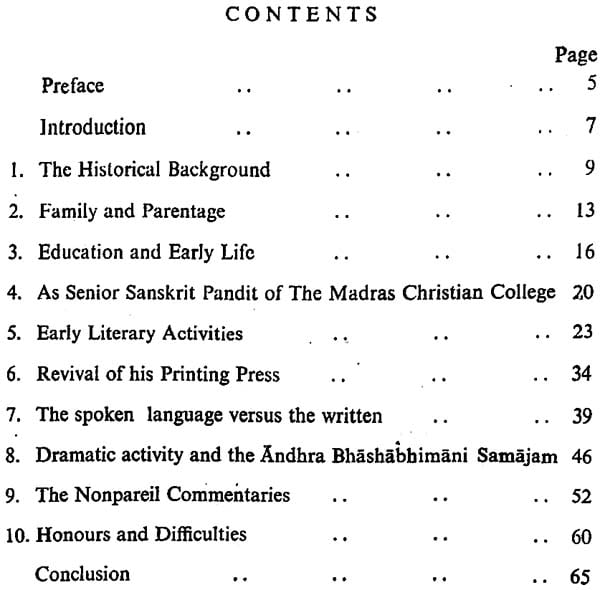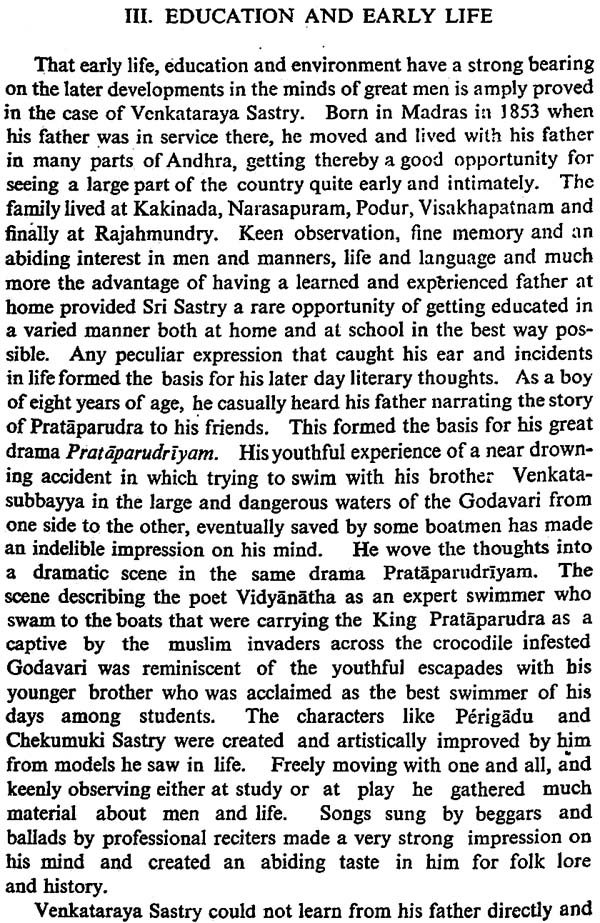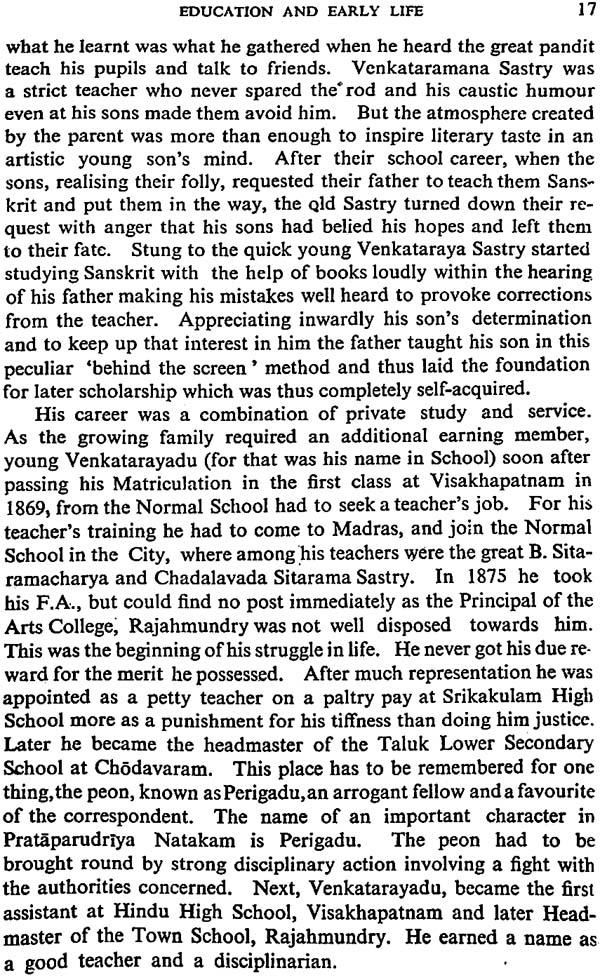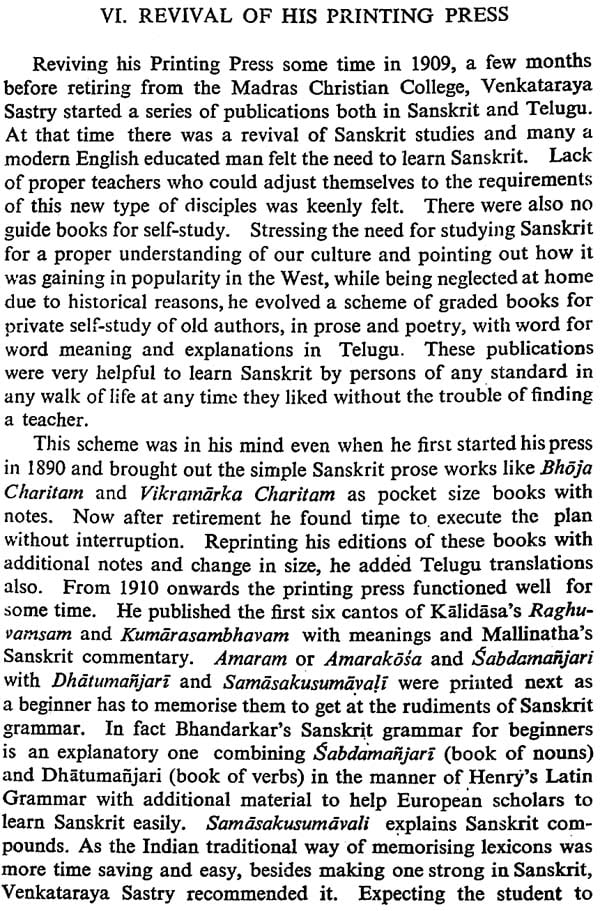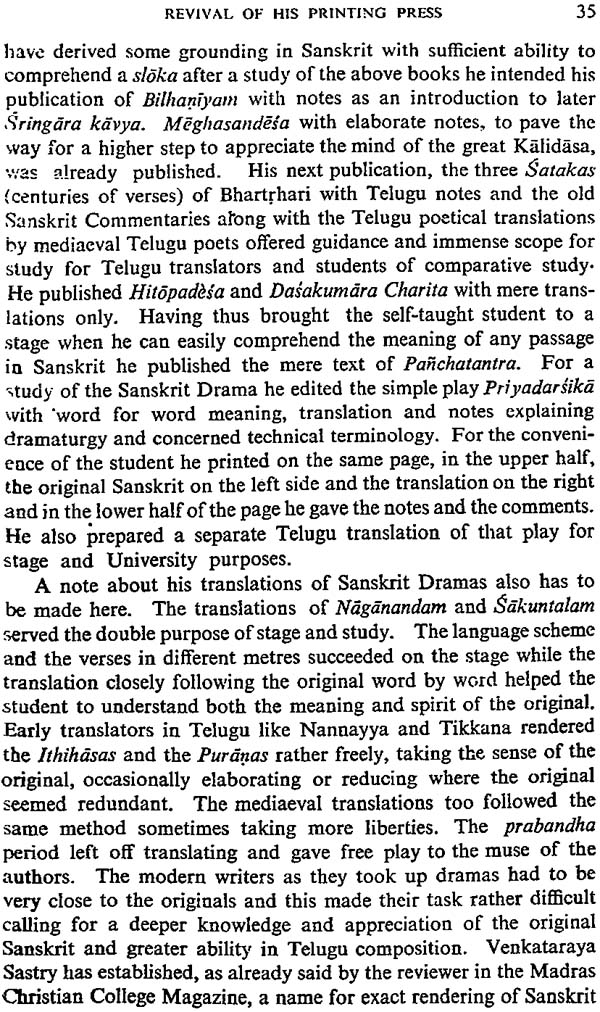
Vedam Venkataraya Sastry (An Old & Rare Book)
Book Specification
| Item Code: | NAQ514 |
| Author: | Vedam Venkataraya Sastry |
| Publisher: | SAHITYA AKADEMI, DELHI |
| Language: | English |
| Edition: | 1991 |
| Pages: | 72 |
| Cover: | PAPERBACK |
| Other Details | 8.50 X 5.50 inch |
| Weight | 100 gm |
Book Description
'A name to conjure with in Telugu Literature', Vedam Venkataraya Sastry was a literary giant, who dominated the Telugu literary field for over half a century between 1875 and 1929, the period which was a turning point in Indian history generally and particularly in literature and its renaissance. He was eminently fit to chalk out new departures in literature and made a remarkable contribution. He was a successful critic, teacher, commentator, speaker and creative artist and was a practical man who started his own printing press and published all his writings. He was a literary titan who, single handed, grappled Himalayan subjects and successfully performed what only vast academic bodies can achieve.
The monograph is a fitting tribute to the giant by this grandson, Vedam Venkataraya Sastry (Junior) who is himself a scholar of depth.
My grandfather, Vedam Venkataraya Sastri, passed away in 1929, when I had completed only sixteen years of age. As such my knowledge of him as a literary personality cannot be either complete or perfect. I missed much of him. None of his con-temporaries, either disciples or admirers, ever wrote any satisfactory account of him. I knew him more as a grandson than as a disciple but living closely with him, I gathered much from him in a casual manner and, after his demise more, in a systematic way, from his disciples. Comparing the knowledge thus gained and piecing together much material culled out from his records and newspaper reports, I prepared a connected biographical account. The late Dr. Alladi Krishnaswamy Iyer approved it and in 1943 I published it, in Telugu, with a foreword by Dr. C. R. Reddi.
Thus it has fallen to my humble lot to write on my grand-father. The subject is vast and varied. Grandfather was an institution by himself and my account at best, can be, only a shadowy glimpse of the glory of a mighty literary giant that he was. Much is left for a study of his works and imagination thereon. My difficulty was also in presenting the subject besides giving a correct and true picture thereof. Many a controversial topic had to be avoided with care and much detail to be com-pressed. Hence this book has taken more of a biographical turn than a purely critical literary estimate. I am sure my readers would feel that there is room for betterment and the subject could be studied well from different angles. With this apology, I am placing this book, though small. before the public with the fond hope that this would lead to a better, and more elaborate study of grandfather's works , with mine only forming an introduction.
I feel much obliged to the Sahitya Akademi, New Delhi for giving me this opportunity to write in English for wider circula-tion. I have also to express my obligations to some of my grandfather's disciples and admirers like the late Sriman N. Ramadas Ayyangar and Sri G. V. Subrahmanyam, Advocate, both of Nellore who read this manuscript and made valuable suggestions.
'Vedam Venkataraya Sastry's is a name to conjure . with in Telugu Literature ', wrote the late patriot and scholar of Andhra, Sri. G. Harisarvottama Rao while-reviewing a book on Sastry in The Hindu of Sunday, the 11th of December, 1938. This is perhaps the briefest and the most telling description of a literary giant who was a dominant figure in the Telugu literary field for over half a century beginning from the last quarter of the nineteenth century and ending with the first of the twentieth. The nineteenth century was a turning point and a creative period in the History of India in general and the literary field in particular. All our Indian languages took a new turn due to Western contact and Telugu was really fortunate in its great savants who were at once pandits of the old Sanskrit tradition and men of modern culture. Belonging to such a period of renaissance these pandits were eminently fit to chalk out new departures in literature and being one of such, the contribution of my grandfather, Vedam Venkataraya Sastry was remarkable. He made a great impression on his contemporaries by his depth of learning, vast and varied writings, practical and profound common sense with a fine sense of humour. Son of an orthodox pandit he first studied English and later Sanskrit and Telugu—rather strange, due to circumstances. He became a Graduate and gave a new orientation to Telugu literature in the field of prose, poetry, drama, criticism and lexicography. A fine critic and an excellent teacher he edited many Sanskrit and Telugu Classics with elaborate commentaries in Telugu, enabling many students to study for themselves at home without a teacher. An interesting speaker, he kept vast audiences spell bound by his excellent lectures, at once entertaining and instructive instilling into them the grandeur of our glorious culture. A creative artist he wrote original dramas in Telugu besides translating some from Sanskrit and got. them enacted both at College and outside giving a fillip to the Telugu Stage. A practical man he started a Printing Press of his own and printed all his writings in different sizes with varied and suitable types, well spaced out with punctuation marks and other easy guides trying to bring down the cost of books for larger and wider circulation. An entertaining conversationalist he attracted by his spicy anecdotes not only his students, but a vast literary public who were constantly meeting him and learning from him with veneration. A man of common sense and clear thought his methods of approach were quick and time saving enabling scholars to make good progress within a short time with ease. With an excellent memory and vast study he was a walking encyclopedia capable of quoting offhand any passage either from Sanskrit or Telugu dispelling the doubts of his friends and students, then and there. A titan for work he always grappled Himalayan subjects and, single handed performed what whole academies alone could undertake and achieve. An orthodox Brahmin he opposed re-formers who were misinterpreting Sastras in their zeal for quick reforms but was not, by himself, in anyway opposed for progressive changes in society. All this was due, not a little, to his knowledge of English and the Western type of education he received and the influence of the times.
